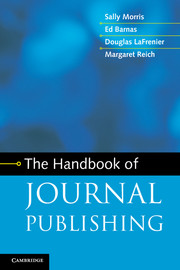Book contents
- Frontmatter
- Contents
- Preface and acknowledgments
- 1 Introduction to journals
- 2 Managing journals
- 3 Editing
- 4 The production process
- 5 Journal metrics
- 6 Marketing and sales
- 7 Fulfillment
- 8 Journal finances
- 9 Subsidiary income
- 10 Contract publishing
- 11 Copyright and other legal aspects
- 12 Ethical issues
- 13 The future of scholarly communication
- Appendix 1 Glossary
- Appendix 2 Resources
- Appendix 3 Vendors
- Index
- References
1 - Introduction to journals
Published online by Cambridge University Press: 05 March 2013
- Frontmatter
- Contents
- Preface and acknowledgments
- 1 Introduction to journals
- 2 Managing journals
- 3 Editing
- 4 The production process
- 5 Journal metrics
- 6 Marketing and sales
- 7 Fulfillment
- 8 Journal finances
- 9 Subsidiary income
- 10 Contract publishing
- 11 Copyright and other legal aspects
- 12 Ethical issues
- 13 The future of scholarly communication
- Appendix 1 Glossary
- Appendix 2 Resources
- Appendix 3 Vendors
- Index
- References
Summary
Journals have been, for more than 350 years, a key part of the fabric of scholarly communication. They enable scholars to communicate their ideas and discoveries across time as well as space; thus the sum of human knowledge and understanding is gradually increased, as others are able to integrate, question, and build on the work of their predecessors (as in Newton’s famous remark “if I have seen further it is by standing on ye sholders of giants” [Newton, 1676]).
In November 2012, there were 28,714 active peer-reviewed, scholarly journals listed in the Ulrichsweb database (Ulrichsweb, 2012) and there are certainly many more, particularly in languages other than English; this number has been increasing steadily by around 3 per annum, and will no doubt continue to do so. Jinha estimated that by 2009, some 50 million individual articles had been published since the first journals appeared in 1665 (Jinha, 2010); for about every 100 additional articles written, a new journal is created (Mabe, 2003).
No accurate estimates are available for the global value of the scholarly journals market; in 2011, the global market for all scholarly, peer-reviewed journals was variously estimated at $9.4bn (Outsell, 2012) to $10.3bn for science, technology, and medicine (STM) alone (Simba Information, 2012). This is not large in the overall scheme of things – in 2010, the market for chocolate and confectionery in the UK alone was estimated at approximately $7.72bn (KeyNote, 2011)!
- Type
- Chapter
- Information
- The Handbook of Journal Publishing , pp. 1 - 27Publisher: Cambridge University PressPrint publication year: 2013

